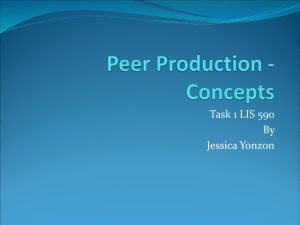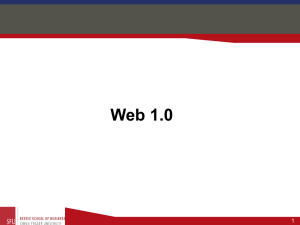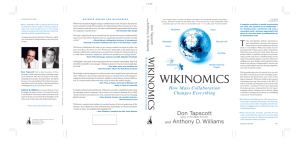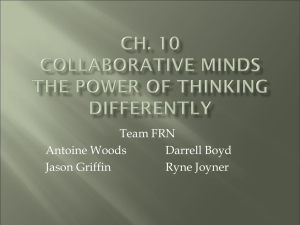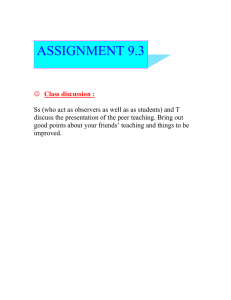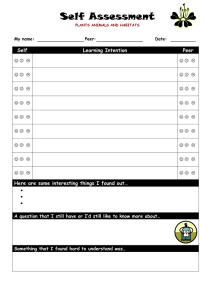2009 CEO Roundtable Welcome! November 11, 2009
advertisement
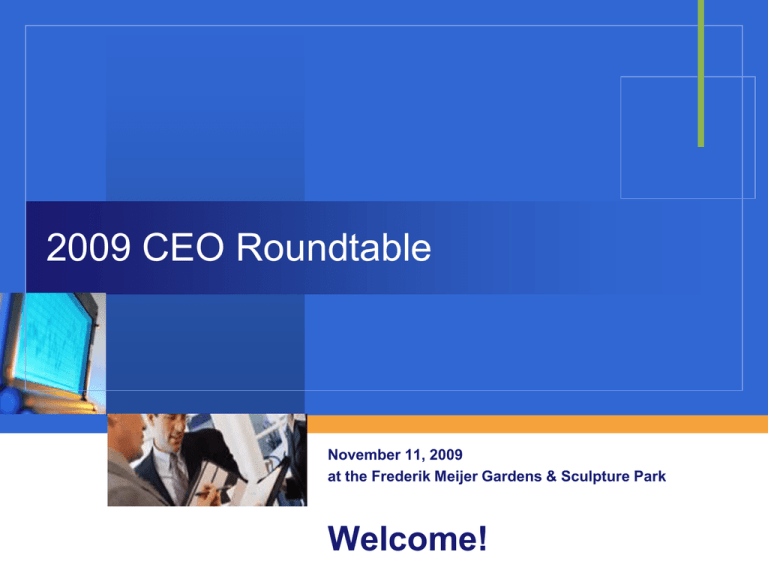
2009 CEO Roundtable November 11, 2009 at the Frederik Meijer Gardens & Sculpture Park Welcome! Today’s Agenda Morning (10:00-12:30) Afternoon (1:15-3:45) 10:00 Introduction: 1:15 Topic 2 Group Interaction Collaboration 2.0 (Randy Karnes) 10:30 Topic 1 Group Interaction 15 minutes “meet the group” and assign a presenter 30 minutes group discussion 5 minutes for each group to report to the entire room 30 minutes group discussion 5 minutes for each group to report to the entire room 2:35 Break 2:45 Wrap-Up A Network of Business Designers Collaboration 2.0 Can we change credit union organizations to move from Collaboration 1.0 to Collaboration 2.0 in the minds of our best and brightest business designers? 3 Collaboration 1.0 Word Association Google CEO Eric Schmidt says, “When you say ‘collaboration,’ the average forty-five-year-old thinks they know what you’re talking about – teams sitting down, having a nice conversation with nice objectives and a nice attitude. That’s what collaboration means to most people.” Collaboration 1.0: Potentially overvalued, oversold, and just plain worn out as part of the credit union industry narrative Has it lost its competitive advantage? 4 Collaboration 2.0: Dramatically Different “The new promise of collaboration is that with peer production we will harness human skill, ingenuity, and intelligence more efficiently and effectively than anything we have witnessed previously...Peer production will displace traditional corporation hierarchies as the key engine of wealth creation in the economy.” From Wikinomics: How Mass Collaboration Changes Everything by Don Tapscott & Anthony D. Williams Can our industry find a new narrative for how we use collaboration and match our organizational designs to the energy of today’s networked world? Can we list our tactical application of Collaboration 2.0 as a competitive advantage for our organizations? 5 Go Beyond Collaboration 2.0 With Your Design The networked world challenges us with new motivations for business designers Being Open...Peering...Sharing...Acting Globally It challenges us to take technical examples of these concepts and translate them into the drivers that a business leader uses to steer an organization on a daily basis It runs against the grain Traditionally, company designs “have been closed in their attitudes toward networking, sharing, and encouraging selforganization, in large part because conventional wisdom says that companies compete by holding their most coveted resources close to their chest.” (Tapscott & Williams) Our new narrative—an elevator speech for the motivations to design businesses in a new way—requires a new glossary of terms that are readily understood and translated through how you act 6 The Principles of Wikinomics Being Open “...Openness is associated with candor, transparency, freedom, flexibility, expansiveness, engagement, and access. Recently, smart companies have been rethinking openness, and this is beginning to affect a number of important functions, including human resources, innovation, industry standards, and communications.” From Wikinomics: How Mass Collaboration Changes Everything by Don Tapscott & Anthony D. Williams Openness is not always about technology; it’s about your mindset in designing business processes and functions 7 The Principles of Wikinomics Peering “...A new form of horizontal organization is emerging that rivals the hierarchical firm in its capacity to create information-based products and services, and in some cases, physical things...this new form of organization is known as peering.” From Wikinomics: How Mass Collaboration Changes Everything by Don Tapscott & Anthony D. Williams To get something done, does your business design always require going up the chain to get approval to act, to adopt a design, to serve a customer, or solve a problem? Can you afford the time it takes and the rigidity when all around you, networks are being used as the new way for moving the ball forward? 8 The Principles of Wikinomics Sharing “...Firms in electronics, biotechnology, and other fields find that maintaining and defending a proprietary system of intellectual property (IP) often cripples their ability to create value. Smart firms are treating IP like a mutual fund—they manage a balanced portfolio of assets, some protected and some shared...Companies can’t collaborate effectively if all of their IP is hidden.” From Wikinomics: How Mass Collaboration Changes Everything by Don Tapscott & Anthony D. Williams In today’s world, what you know as a competitive advantage has a shorter and shorter shelf life. Get paid for what you do...be part of the growing transactions in the network world, be valuable for actions 9 The Principles of Wikinomics Acting Globally “...A truly global company has no physical or regional boundaries. It builds planetary ecosystems for designing, sourcing, assembling, and distributing products on a global basis...The world is teeming with possibilities for education, work, and entrepreneurship—one just needs the skills, motivation, the capacity for lifelong learning, and a basic income level to get connected.” From Wikinomics: How Mass Collaboration Changes Everything by Don Tapscott & Anthony D. Williams Global doesn’t have to mean the planet Earth... Can you design a firm that interacts across organizational boundaries and is effective at harvesting an infinite set of resources instead of relying on a financial engine that is based on a scarcity of resources? 10 Your Assignment, Mr. Phelps... 11 Topic 1 Theme (a.m.) Topic 2 Theme (p.m.) Collaborative Opportunity Learn From a Peer Group discussion topics for Everybody talks “best this morning were selected to get the groups focused on the power of our network and the possibilities for expanding what we might do together Whether it be the entire CUSO, or just small groups within the CUSO, or even something you would do with only one other partner...what business opportunities are out there? practices” but seldom do you have a chance to relate best practice around such a common base of resources and capabilities We have an opportunity to leave this room with an idea, a mentor for the idea, and some common tools that should speed an idea to reality in our operations Learning from a peer is a skill, and a competitive advantage Topic 1 Theme (a.m.) Collaborative Opportunity 12 Group Topic 1&6 List 3 things you have purchased from consultants that you wish you would have counted on other network participants to share. List 3 questions that you would like our network to ponder. 2&7 List 3 things you are now worried will not be available based on the Corporate Credit Union reorganization. Do you think our network could create a solution for any of these? 3&8 What keeps you up at night? Could this worry be solved with a collaborative solution? Come up with 3 ideas. 4&9 List 4-5 businesses you think our network should consider. Then list 1-3 resources, services, or other input you might sell to the network to help man these new businesses. 5 & 10 Our network represents 3,000 employees: how could we network those employees to improve their careers, harness the power of our organizations, and show how social networks for business networks? Shoot for 3-5 ideas. Lunch Let’s eat! 13 Topic 2 Theme (p.m.) Learn from a Peer 14 Group Topic 1&6 What were your 3 most effective cost-cutting tactics in the last two years, and why? Shoot for 9 examples from your team. 2&7 List the top 3 membership drive concepts that have worked for your credit union. Shoot for 9 examples from your team. 3&8 What would you list as your top 3 long-term investments in laying the foundation for your credit union’s sustainability going into the future? What do you hang your hat on when you look down the road 10 years? Shoot for 6-9 examples. 4&9 If you could change one thing about your Board, what would it be? Shoot for 4-5 things. Then list 1-2 things you have tried and been successful with in managing your Board. 5 & 10 List your top 3-5 time management tactics for surviving in this email/phone call/information overload age. A Network of Business Designers Wrapping Up the Day 15 Collaboration 2.0: We Are Not Alone www.nacuso.org 16 Collaboration 2.0: We Are Not Alone But We Are a Stellar Example 17 A network for credit unions to capitalize on all that Collaboration 2.0 promises for peers working together Collaboration 2.0: We Are Not Alone But We Are a Stellar Example 18 A network where credit unions can redefine peers, both inside and outside of credit union operations, for their members’ success Collaboration 2.0: We Are Not Alone And Everyone Is Trying To Tell the Story 19 This morning, I reminded everyone that our foundation is in peer production, and that we should be the poster child for building businesses in a networked world It should be the natural evolution for us...for years we’ve taking pride in collaboration as the foundation for all that we accomplish But giving a quick elevator The cuasterisk.com narrative: speech on Collaboration 2.0, and how our network walks the talk, can be difficult Here is cuasterisk.com’s 2009 project towards that goal If the 2010 CEO Roundtable was a video shoot, what might you say about how we are all walking the talk together? Thanks for the day! 20
